
By Daniele Foti-Cuzzola
Spanish-born Benedictine monk Bishop Rosendo Salvado is arguably one of Western Australia’s most captivating historical icons.
Arriving in Fremantle in 1846, Bishop Salvado was considered ahead of his time as he set out to do the unthinkable and establish a largely self-sufficient monastic town in the middle of the unforgiving Western Australian outback.
Unlike the majority of the wider Australian community who were looking to eradicate the indigenous culture, Bishop Salvado respected the indigenous culture and looked at ways for the two cultures to co-exist peacefully.
Due to his devotion to his mission and dedication, Bishop Salvado defied all odds and succeeded in his mission and founded the only monastic town in Australia, New Norcia. More than 100 years since his death, Bishop Salvado continues to inspire and now his incredible story is coming to the big screen in a feature documentary, From Rosendo to Rosendo, which is screening in Perth as part of this year’s Spanish Film Festival.
From Rosendo to Rosendo, which was produced by the Spanish Embassy, commemorates Bishop Salvado’s life through the eyes of Spanish rock star, Rosendo Mercado, who visits New Norcia to learn more about the first Rosendo in Australia.
University of Western Australia Associate Professor John Kinder, who appears in the film, is not surprised that Bishop Salvado’s story is receiving the big screen treatment despite so many years having passed since his death.
“Bishop Salvado is such an important part of Western Australian history. I think he is a fascinating person and it’s impossible not to be attracted to Bishop Salvado. He’s larger than life,” he added.
Assoc. Professor Kinder said he became captivated by Bishop Salvado’s story when he visited New Norcia ten years ago.
“What got me hooked on Bishop Salvado was meeting the monks and the community in New Norcia and seeing the work that Bishop Salvado did has continued in different ways but is still fundamentally inspiring,” he said.
Since then, Assoc. Professor Kinder has delivered a number of presentations on the Benedictine monk’s life.
“I think the world today needs heroes. We need role models and people like Bishop Salvado are such extraordinary examples.
“Every time I’ve talked about Bishop Salvado, teenagers or students are always fascinated by the way he did things.
“Soldiers have this motto, ‘face the fear and do it anyway’ and Bishop Salvado took on some seriously challenging projects and he knew exactly how difficult things were. But he gave it his best.
“He reminds me of Saint Mary Mackillop in the sense that they dedicated their lives for others. Because of their love for Jesus Christ, both of them gave themselves completely to the challenges they had before them.
“They left the results to God. And that’s the really interesting part. They knew that the results and the outcome of their work were not completely in their control,” he said.
In the film, Bishop Salvado is praised for his many talents including his musical ability, devotion to his faith and leadership qualities, but one aspect of Bishop Salvado’s life that Assoc. Professor Kinder believes has contributed to his legacy is his relationship with Indigenous Australians.
“His work with Aboriginal people is complicated, and the film examines that from different angles. He wanted to show the local British authorities that Aboriginal people were the equal of white people in every respect.
“Bishop Salvado knew their culture, he knew it very well but he wanted to open up the Noongar people to European culture in a way that respected their culture,” he said.
At the time of his death, Bishop Salvado’s dream had come to fruition. He had established a monastic town in rural Western Australia that boasted stunning Spanish architecture, a Monastery, a Church, shops and an extensive farm.
Today, the majority of these activities have ceased and the number of residents in the community has diminished.
But Assoc. Professor Kinder insists that Bishop Salvado would still be considerably proud of his achievements.
“Bishop Salvado established a community of monks and sisters that is continuing and keeps inspiring people. His dream was to help the local people, the Noongar people to set up their own self-supporting village and it didn’t happen but it was his dream.”
When asked how he thinks Bishop Salvado would view his work and legacy today, Assoc. Professor Kinder said that he thinks that Bishop Salvado would give thanks to God for everything.
“I think he was foremost a realist. I don’t think he would be too hung up that New Norcia changed but he would look at the situation and go alright, what’s the next job,” he said.
Cinema Paradiso is hosting a special Q&A session and screening of From Rosendo to Rosendo with Professor John Kinder and Dom Robert Nixon osb, composer and organist from the New Norcia Benedictine Community on Tuesday, 9 May.
For more information, visit www.spanishfilmfestival.com